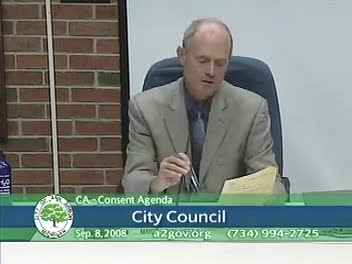Ann Arbor council adopts citizen participation ordinance to expand early notice for development projects
Get AI-powered insights, summaries, and transcripts
Subscribe
Summary
The Ann Arbor City Council voted to amend zoning and subdivision chapters to require earlier and broader public notification for developments that require a public hearing, expanding the notification radius and adding opt-in notice tools.
The Ann Arbor City Council on first reading approved an ordinance amending Chapter 55 (Zoning) and Chapter 57 (Subdivision and Land Use Control) to add a citizen participation requirement that expands early notice and public involvement for developments that trigger public hearings.
The ordinance, moved by Councilmember Sabra Briere and seconded by Councilmember Lowenstein, calls for earlier notification of proposed projects, enlarges the mailed-notice radius from 300 feet to 500 feet for projects that require a public hearing, and requires petitioners to document early outreach and meetings with neighbors. A companion resolution authorizing summary publication of Ordinance No. 8929 also passed.
Councilmember Sabra Briere, who sponsored the change, said the rule is intended to involve neighbors before developers have invested heavily in plans. "If it's a significant development that could have an impact on existing neighborhoods and surrounding properties, this involvement will take place before the developer begins working with [the] planning department," Briere said.
Supporters who filled council chambers said the change would reduce late surprises and improve outcomes. Marian Williams, a resident and speaker at the public hearing, said earlier notification could have prevented problems in a previous project she cited. "After having been involved in a very difficult, rigorous, and lengthy process ... I hope that council will approve this amendment to the city code in order to implement a more positive and efficient process for citizen notification and participation early on," Williams said.
Margaret Wong, a longtime Ann Arbor resident and neighborhood advocate, said the city needs tools to preserve the community's human scale and design quality. "This ordinance is an important step in that direction and must be implemented by the city with full commitment and sense of purpose," Wong said.
Connie Pulsipher and planning staff explained the ordinance applies to petitions that require any kind of public hearing (major projects such as PUDs and other petition types that already trigger hearings). Staff said administrative approvals that do not trigger a public hearing are not covered by this ordinance; developers whose proposals are processed administratively will not be subject to the same expanded notice and meeting documentation requirements. Planning staff also said the city is working to expand online access and to let residents opt in to e-mail lists for project notices.
Opponents raised no formal objections during the hearing; several neighborhood leaders and association presidents urged passage. Chris Crockett, president of the Old Fourth Ward Association, told the council that public involvement helps avoid "unintended consequences of bad development we end up living with for decades."
Councilmembers emphasized the ordinance does not guarantee consensus on every project, but they said it should empower residents to provide input earlier in the planning timeline. The council adopted the ordinance on first reading and approved a companion resolution authorizing summary publication that will place the ordinance on the public record.
